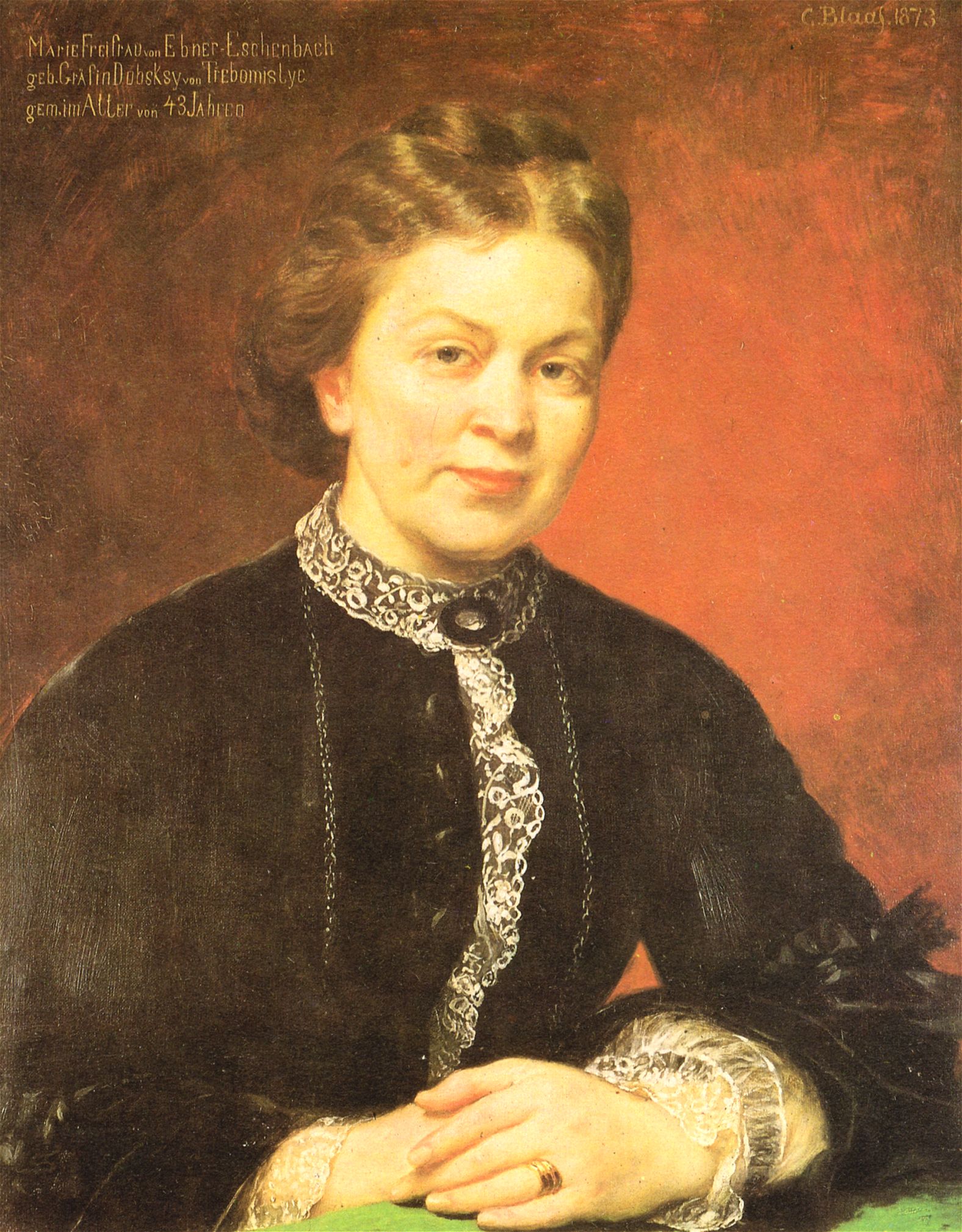Marie von Ebner-Eschenbach Frases y Citas
Marie von Ebner-Eschenbach: Frases en inglés
Es gibt Menschen mit leuchtendem und Menschen mit glänzendem Verstande. Die ersten erhellen ihre Umgebung, die zweiten verdunkeln sie.
Fuente: Aphorisms (1880/1893), p. 28.
“An aphorism is the last link in a long chain of thought.”
Ein Aphorismus ist der letzte Ring einer langen Gedankenkette.
Fuente: Aphorisms (1880/1893), p. 19.
“As an artist, you should not wish to create what you don’t feel you have to create.”
Künstler, was du nicht schaffen mußt, das darfst du nicht schaffen wollen.
Fuente: Aphorisms (1880/1893), p. 21.
“That bad manners are so prevalent in the world is the fault of good manners.”
Dass soviel Ungezogenheit gut durch die Welt kommt, daran ist die Wohlerzogenheit schuld.
Fuente: Aphorisms (1880/1893), p. 72.
Die einfachste und bekannteste Wahrheit erscheint uns augenblicklich neu und wunderbar, sobald wir sie zum ersten Mal an uns selbst erleben.
Fuente: Aphorisms (1880/1893), p. 20.
“However much you paid for a beautiful illusion, you got a bargain.”
Fuente: Aphorisms (1880/1893), p. 80.
“We are so vain that we value the opinion even of those whose opinions we find worthless.”
Aphorisms http://books.google.com/books?id=BeEnAAAAYAAJ&q="We+are+so+vain+that+we+value+the+opinion+even+of+those+whose+opinions+we+find+worthless".
“A poor, charitable person can sometimes feel rich, a miserly Croesus never.”
Ein armer wohlthätiger Mensch kann sich manchmal reich fühlen, ein geiziger Krösus nie.
Fuente: Aphorisms (1880/1893), p. 74.
“The greatest leveler is politeness; it removes all class distinctions.”
Die größte Gleichmacherin ist die Höflichkeit, durch sie werden alle Standesunterschiede aufgehoben.
Fuente: Aphorisms (1880/1893), p. 58.
“The moral code which was good enough for our fathers is not good enough for our children.”
Fuente: Aphorisms (1880/1893), p. 85.
“What do people like to call stupid the most? Something sensible that they can’t understand.”
Was nennen die Menschen am liebsten dumm? Das Gescheite, das sie nicht verstehen.
Fuente: Aphorisms (1880/1893), p. 37.
Niemand ist so beflissen, immer neue Eindrücke zu sammeln, als derjenige, der die alten nicht zu verarbeiten versteht.
Fuente: Aphorisms (1880/1893), p. 61.
“It is a characteristic of the great that they demand far less of other people than of themselves.”
Merkmal großer Menschen ist, daß sie an andere weit geringere Anforderungen stellen als an sich selbst.
Fuente: Aphorisms (1880/1893), p. 35.
“Silly people say stupid things, clever people do them.”
Alberne Leute sagen Dummheiten. Gescheite Leute machen sie.
Fuente: Aphorisms (1880/1893), p. 70.
“The insignificant labor, the great create.”
Die Kleinen schaffen, der Große erschafft.
Fuente: Aphorisms (1880/1893), p. 61.
“People who read only the classics are sure to remain up-to-date.”
Wenn man nur die Alten liest, ist man sicher, immer neu zu bleiben.
Fuente: Aphorisms (1880/1893), p. 24.
Unerreichbare Wünsche werden als »fromm« bezeichnet. Man scheint anzunehmen, dass nur die profanen in Erfüllung gehen.
Fuente: Aphorisms (1880/1893), p. 27.
“Only those few people who practice it believe in goodness.”
In das Gute glauben nur die Wenigen, die es üben.
Fuente: Aphorisms (1880/1893), p. 29.
“Nothing makes us more cowardly and unconscionable than the desire to be loved by everyone.”
Fuente: Aphorisms (1880/1893), p. 82.
Wer die materiellen Genüsse des Lebens seinen idealen Gütern vorzieht, gleicht dem Besitzer eines Palastes, der sich in den Gesindestuben einrichtet und die Prachtsäle leer stehen lässt.
Fuente: Aphorisms (1880/1893), p. 53.
“Old age either transfigures or stultifies.”
Das Alter verklärt oder versteinert.
Fuente: Aphorisms (1880/1893), p. 25.
“It is unfortunate that a good talent and a good man seldom come together.”
Es ist ein Unglück, daß ein braves Talent und ein braver Mann so selten zusammen kommen!
Fuente: Aphorisms (1880/1893), p. 25.
“Prejudice supports thrones, ignorance altars.”
Vorurteil stützt die Throne, Unwissenheit die Altäre.
Fuente: Aphorisms (1880/1893), p. 65.
“It is difficult to see the person who admires us as stupid.”
Es ist schwer den, der uns bewundert, für einen Dummkopf zu halten.
Fuente: Aphorisms (1880/1893), p. 72.
Ein scheinbarer Widerspruch gegen ein Naturgesetz ist nur die selten vorkommende Betätigung eines andern Naturgesetzes.
Fuente: Aphorisms (1880/1893), p. 36.
Der Umgang mit einem Egoisten ist darum so verderblich, weil die Notwehr uns allmählich zwingt, in seine Fehler zu verfallen.
Fuente: Aphorisms (1880/1893), p. 45.
“The world belongs to those who possess it, and is scorned by those to whom it should belong.”
Fuente: Aphorisms (1880/1893), p. 53.
